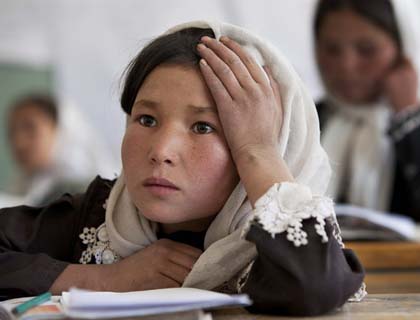As a result of the Soviet war, and the civil war which occurred abruptly in our country Afghanistan afterwards, many schools were destroyed and the education process as a whole in Afghanistan was negatively affected. The destruction of the education infrastructure went to an extreme level when the Taliban conquered and ruled most of Afghanistan. Except for some religious education, girls and women were forbidden to learn. Even for men, the curriculum was highly dominated by religious studies instead of science, technology, literature, etc.
What the Taliban did in terms of education goes against Islam and what the Prophet of Islam, Muhammad (PBUH), preached. Holy Prophet Muhammad (PBUH) told his followers in the early days of Islam to "seek knowledge from the cradle to the grave", and that "the ink of the scholar is more sacred than the blood of the martyr”. Islam requires education for all, both men and women.
Education in Afghanistan has greatly improved since Taliban were overthrown in late 2001. According to recent estimates from Afghanistan's Ministry of Education, more than 5.4 million children are enrolled in schools today, nearly 35% of them girls. Even though many arguments have been made criticizing the status and rate of development of the educational system in Afghanistan; and despite efforts by the Taliban to burn and shut down many schools, especially for girls in the South and East, more Afghans now attend schools or receive some sort of education than ever in its modern history. According to Afghanistan’s constitution (adopted in January 2004), education is the right of all citizens (both men and women), and up to a certain level, it is free of charge.
Moreover estimations also depict that about 45% of males and 13% of females are literate in the country, which is far better than the past, but keeping in view the modern world, it cannot be considered satisfactory enough, as the criteria for being included in the above mentioned number is only being able to read or write a bit. Further, the number of schools has risen to a considerable rate. Almost 5000 schools have been built but most of them lack proper facilities of education. And with the rise in the number of schools there has been 7-fold rise in the number of teachers as well, but unfortunately, only 22% of them meet the minimum qualification of Grade 14, while only a negligible number has professional teaching training.
Moreover, almost 40,000 students graduate from high school every year and only one-third get admitted in universities, while others run after jobs, as their families cannot afford to support them for too long. Another development that has been made in education sector is the addition of private institutes in the urban areas of the country. They, definitely, seem to have better education methodology regarding modern education but majority of the students cannot have access to that education because of the high fees charged by them.
Provided that there have been appreciations of formal educational institutes, a large number of madressahs still exist in the country and people have the inclination to send their children to such madressahs, where they have “Extremism” as the only subject in their syllabus. In addition, discriminating sentiments against females are very common in most parts of the country. It is still considered not appropriate enough to admit them in schools.
A lot more still needs to be done in order for Afghanistan to have what modern nations have for their citizens today. An estimated 11 million Afghans are still illiterate, many schools lack proper facilities, the number of qualified teachers are still low, and a major obstacle that needs to be overcome is a cultural bias that many Afghans have, especially in the conservative areas towards the necessity of educating women.
In the dark era where we Afghans were busy in shedding blood of each other the countries in our neighborhood were utilizing the time by concentrating on their educational system, they were operating on how to keep us busy on nonsense matters and build their educational infrastructure; nonetheless there is always an opportunity in grabbing the gone chances. Educating a community is as important as water for survival in the desert.
We need to realize this evident fact that the nations that have gotten strong hold of education in the process of their evolution have been able to achieve remarkable gains. It has been through proper development in the education sector and education system that such countries are standing much apart from others with well-being and dignity kneeling before them submissively. Through their modern education system they have not only served humanity by opening new vistas of knowledge but have also facilitated their people by bringing comfort and facilities on their door steps. Apart from that, they are on the driving seat regarding the international socio-political scenario, while the countries that lack proper emphasis on education are left much behind in almost all the fields of life.
At the present time nothing is so urgently required for our nation as modern education – Education that should be based on up to date information, analysis and developments in different fields of knowledge and must be aided with modern technology; education that can give the coming generation of Afghanistan an outlook other than extremism. And all these have to be provided to the people of Afghanistan without charging them much, as majority of the people are already suffering severely under the reign of deteriorated socio-economic situation.

